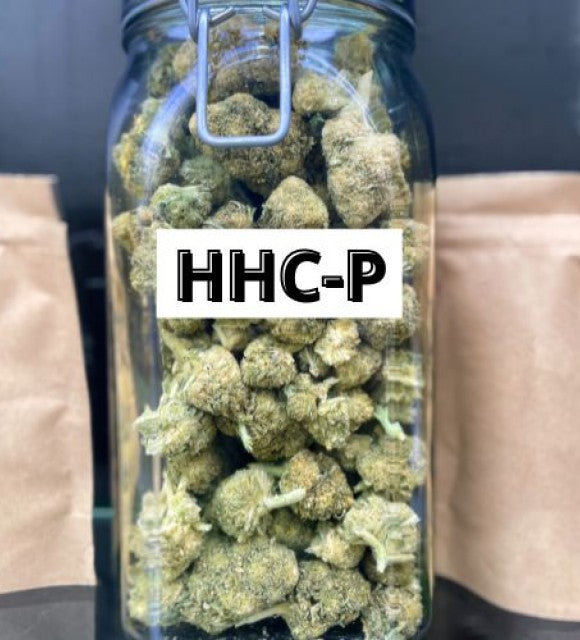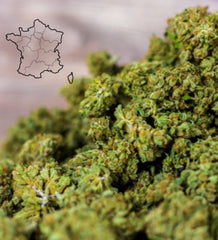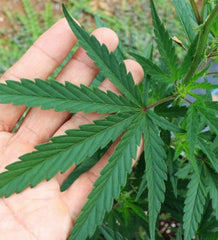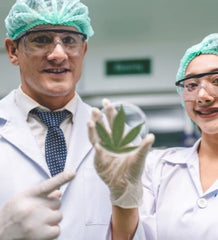
HHCP: Everything you need to know about this mysterious cannabinoid
HHCP: But what are we talking about, exactly?
Hexahydrocannabinol, or HHCP for short, is the brainchild of American chemist Roger Adams in 1947. By manipulating Delta 9 THC, the famous compound that gives recreational cannabis its psychoactive effects, Adams created HHCP, giving it two more carbons on its alkyl chain than its cousin, HHC.
The molecular structure of HHCP, composed of six carbon atoms, two hydrogen atoms attached to each carbon, and four oxygen atoms, gives it analgesic, anti-inflammatory, antioxidant, and relaxing properties, like CBD. But where things go wrong is in the psychotropic effects, which are particularly pronounced due to the molecule's affinity with the "CB 1" receptors of the endocannabinoid system, which is massively present in the brain.
HHCP has another unique feature: its impressive resistance to the elements. Capable of withstanding temperatures exceeding 100°C, imperturbable and insoluble in water, the molecule is robust and unalterable. This particularity opens up interesting perspectives for its use, while raising questions about its impact and regulation. One thing is certain, HHCP has not finished making waves, particularly in the medical sphere where it may potentially play a role in the management of stubborn pain associated with certain serious pathologies (cancers, multiple sclerosis, neurological pathologies, etc.).
Its resistance is actually an opportunity to lower storage costs and facilitate transport, which would guarantee better access to painkillers. Another interest: finding a gentler alternative to opioid drugs, which are highly addictive and responsible for 4 deaths per week and 7 hospitalizations per day in France according to a Figaro investigation .
HHCP and its unique chemical composition
The HHCP life cycle begins with a prodigious chemical transformation. Delta9-THC, under the guidance of cytochrome P450 enzymes, transforms into Delta9-THC-COOH. But for this metamorphosis to be complete and give rise to HHCP, two elements are essential: expertly controlled heat and an acidic environment.
The chemical composition of HHCP, with its 7-carbon chain and generous dose of hydrogenated Delta-8 oil, makes it a rather unique cannabinoid. This structure gives it a remarkable affinity with the "CB 1" receptors of our endocannabinoid system, more than 33 times greater than that of its cousin, HHC, which will be discussed later in this article.
But HHCP isn't just a chemical curiosity. As we discussed in the previous section, it stands out for its therapeutic properties, with interesting potential as a painkiller, anti-inflammatory, antioxidant, and anxiolytic. However, its psychotropic effects negate any interest in the wellness and relaxation sector and confine it to strictly scientific and medical potential in the more or less near future.
HHCP: What are the effects felt?
HHCP, although discovered nearly eight decades ago, remains a mystery to science. Most of our knowledge about it comes from consumer feedback, not from rigorous scientific studies.
Here is what we can say about it so far:
- On the psychotropic effects scale, HHCP sits somewhere between HHC and THC. It's sort of an "optimized" and more potent version of HHC, which isn't really a good thing, as we're dealing with a powerful psychotropic drug;
- While the effects of HHC are almost immediate, those of HHCP sometimes appear after several hours;
- Most users report deep relaxation, increased appetite, intense thirst, and a feeling of euphoria, all of which typically lasts for one to four hours. These are typical effects of a psychotropic cannabinoid like THC.
Caution: While the noticeable effects of HHCP may disappear within a few hours, the substance itself can linger in the body for months due to its long half-life. This means that even long-term use of HHCP can show up in drug tests. It can therefore cost you points on your license, a fine, or even a prison sentence. Vigilance is required! Don't make the mistake of purchasing CBD products from a shady , dubious, or dishonest supplier. A poorly sourced product or one loaded with HHCP can get you into trouble with the law, as well as harm your health.
Having said that, it is still worth mentioning the potential beneficial effects associated with HHCP in a controlled medical setting , although they require further research:
- Anti-inflammatory effects : HHCP could provide an interesting alternative for the treatment of inflammatory skin pathologies such as psoriasis or eczema;
- Analgesic effect : Some users report relief from chronic pain of moderate to severe intensity, particularly related to arthritis and multiple sclerosis;
- Relaxing effect : Like all cannabinoids, HHCP appears to soothe sleep disturbances, stress and anxiety;
- Antioxidant action : by fighting free radicals, HHCP is undoubtedly effective against premature cellular aging.
Please note that these effects, as promising as they may be, are based primarily on embryonic studies. This is not about self-medicating with HHCP... Read the next section.
Is HHCP legal in France?
The verdict was delivered on June 12, 2023: the ASNM (French National Agency for the Safety of Medicines) decided to ban, rightly in our opinion, the sale and consumption of HHCP. This decision was motivated by the obvious narcotic and euphoric effects of this cannabinoid. According to the ASNM, HHCP, like HHC (also banned), also presents risks of addiction. This measure aims to protect the public from the potential dangers associated with these substances, pending more in-depth studies on their long-term effects.
Famous CBD: No HHCP products in our store!
Let's not kid ourselves: HHCP had very high profit potential for at least a year, with fairly strong demand on the French market. Competing brands didn't hesitate to make it a highly visible product on their digital platforms. This isn't our position at Famous CBD.
Fully embracing our status as a leading supplier of legal cannabidiol and hemp products in France and other neighboring countries, we prioritize your safety and well-being.
HHCP has no place in our catalog. Its confirmed psychotropic effects and the risk of addiction it presents prompted us to make this decision well before the June 2023 ban.
Our promise is clear : to offer you healthy, high-quality, sourced, traceable, and affordable CBD and non-psychotropic cannabinoid products to help you improve your daily life with complete peace of mind.





